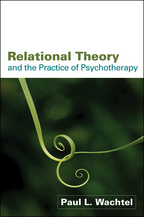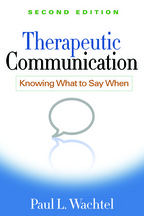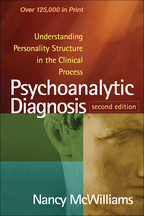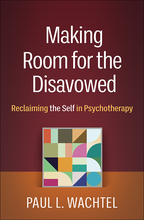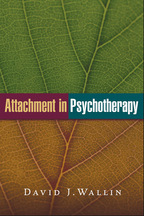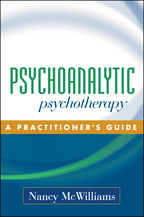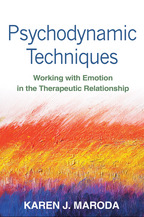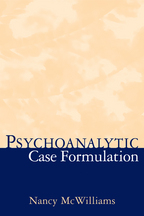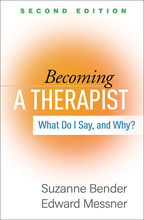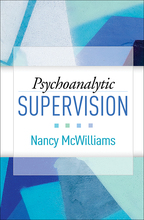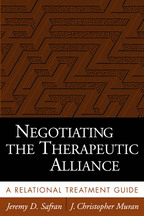Relational Theory and the Practice of Psychotherapy
Paul L. Wachtel
HardcoverPaperbacke-bookprint + e-book
Hardcover
orderDecember 14, 2007
ISBN 9781593856144
Price: $68.00 338 Pages
Size: 6" x 9"
Paperback
orderOctober 19, 2010
ISBN 9781609180454
Price: $45.00338 Pages
Size: 6" x 9"
“Presents helpful examples of the ways in which all of us in our everyday work find ourselves unintentionally criticizing patients and undermining their self-esteem....Wachtel highlights the therapist's supportive approach in providing the necessary conditions of comfort or safety to approach and integrate the aspects of the self that have been split off and repudiated. A particular strength is Wachtel's focus on the language of psychotherapy....This book encourages me about the future of psychoanalysis. It suggests that the eclectic curiosity, and open-mindedness Wachtel exemplifies can lead us to a more patient-centered, humane, and integrative psychoanalysis.”

—Metapsychology Online Reviews
“This book is an excellent way for psychotherapists unfamiliar with how psychoanalysis has changed since Freud to familiarize themselves with recent developments from a writer who does not get lost in the jargon that distances many who find psychoanalytic language lacking in clarity. Psychoanalysts will find some critiques of traditional views and expansions of ways of looking at the clinical situation....Wachtel provides a clear and direct understanding with plenty of clinical examples of how his view of cyclical psychodynamics is informed by relational psychoanalysis. This book is an important contribution to the practice of psychoanalysis and psychotherapy, rewarding and accessible to anyone involved in this enterprise.”

—Psychoanalytic Psychology
“Paul Wachtel shows how relational theory has redirected psychoanalytic inquiry toward a more powerful understanding of the actual experiences with other people that underlie personality development. He demonstrates how even the most deeply unconscious processes must be viewed in the context of daily interactions and broader social and cultural dynamics....The book will greatly advance the work not only of therapists who work in a psychodynamic vein, but also of those who have previously found psychoanalytic approaches uncongenial. This clearly written, thought-provoking work will be a valuable text in psychotherapy graduate programs, and will be read with interest by clinical psychologists, counselors, psychiatrists, social workers, and other mental health practitioners.”

—APA PsycINFO
“This book is a worthy successor to Mitchell and Aron in presenting the most contemporary comprehensive statement of relational thought. Wachtel focuses on the evolution of relational thinking in psychoanalysis, and successfully tries to illustrate its importance to nonpsychoanalysts....Wachtel sets out his arguments with irresistible logic, describing the limits of the archaeological metaphor of psychoanalysis, and outlining his own cyclical-contextual model....The text is very scholarly, replete with references across the range of psychoanalytic literature....The book is attractive in layout and free from production errors. The price is reasonable. The author fulfills the purpose of the book admirably. It is must reading for all serious practitioners of psychotherapy.”

—Canadian Journal of Psychiatry
“Paul Wachtel has a long and distinguished career as a psychotherapist, teacher, and writer, with a strong interest in integrative psychotherapy....I think a good case can be made that psychoanalysis, since Freud, is on a systemic direction of travel. Wachtel has brilliantly illuminated an important phase on the later stages of that incomplete journey. The potential for meaningful dialogue across the systemic and analytic domains through an increasingly shared language has never been higher.”

—Journal of Family Therapy
“This is a remarkable, rich, and ambitious book....This is a wonderful book. It affirms much that we actually do, it teaches much wisdom, and sparks with therapeutic enthusiasm.”

—Journal of the American Academy of Psychoanalysis and Dynamic Psychiatry
“This is a most helpful book for clinicians in several respects. First, it is written in an engaging style that holds the reader's attention even as Wachtel addresses complex theoretical distinctions and their practice implications. Second, Wachtel clearly articulates the basic tenets of relational psychoanalytic theory and its differences from earlier psychoanalytic theories. Third, he describes the technical implications of these differences with practical suggestions and superb clinical illustrations. Finally, he adds his particular integrative psychodynamic perspective to the body of literature on relational theory and practice. All of this makes it an important book for clinicians at all levels of sophistication....Wachtel demonstrates that an integrative approach that is grounded in a thorough understanding of the theories and practice models involved can enhance practice. He argues persuasively that integrative practice has its risks, but so does orthodoxy. He challenges us as clinicians to move beyond our comfort zones.”

—Clinical Social Work Journal
“Dr. Wachtel's scholarly approach brings a progressive and integrative tone to the study of psychotherapy....This is an excellent book about the changes in perspectives in psychoanalysis and is very persuasive about the merits of the relational model. I recommend it to all who are interested in the practice of psychotherapy.”

—Journal of Nervous and Mental Disease
“What a pleasure it is to review Paul Wachtel's newest book, Relational Theory and the Practice of Psychotherapy. In this very scholarly, astute, and accessible book, Watchtel covers the most important tenets of relational psychotherapy....Wachtel's clinical examples are very rich and particularly congruent with social work values. Throughout he emphasizes collaboration with the client by developing new narratives, building on client strengths, and depathologizing....The book is especially creative in its integration of neuroscience, forms of memory (procedural and explicit), infant research, attachment theory, internal working models, family and systems therapy, cognitive and behavioral therapy, and trauma theory. Interwoven throughout are contemporary contributions to relational theory and practice so that these models provide the reader with exposure to multiplicity of contemporary theories. This is no small feat!”

—Families in Society
“There is a new wind blowing in psychoanalysis. Contemporary theorists and clinicians are rethinking fundamental assumptions of psychoanalytic practice and searching for more effective ways to understand patients and help them overcome problems. This conceptually rich volume reexamines the nature of the psychotherapeutic relationship, the place of systemic thinking in psychoanalytic theory, and the role of insight, experience, and acceptance in psychotherapy. It will be valuable to psychodynamic therapists working towards more effective approaches to intervention, and to cognitive-behavioral therapists who wish to explore the richness of the psychotherapeutic relationship and of inner experience. It would be an excellent text for a graduate seminar exploring contemporary approaches to psychoanalysis or integrative approaches to psychotherapy.”

—James Pretzer, PhD, Director, Cleveland Center for Cognitive Therapy
“Wachtel has written yet another classic! This is a book of utmost importance to the field of psychotherapy, one that will benefit both the beginning student and the most seasoned practitioner. Wachtel elucidates the radical clinical implications of the relational turn in psychoanalysis. He shows how this emerging contextualist paradigm lends itself to meaningful integration with a range of modern psychotherapies. Wachtel is not only an important clinical contributor; he is also a master teacher. You will want to read and reread this book.”

—Lewis Aron, PhD, Director, Postdoctoral Program in Psychotherapy and Psychoanalysis, New York University
“Wachtel's magnificent book is a truly remarkable combination of rigorous, comprehensive scholarship and practical clinical wisdom. He brings together the whole range of relational thinking in psychoanalysis in presenting a fully contextual understanding of human emotional experience and its therapeutic transformation. In so doing, he spells out in rich clinical detail the implications of a relational perspective and sensibility for the actual practice of psychotherapy. I highly recommend this clinician-friendly book to students, trainees, and seasoned practitioners of psychotherapy.”

—Robert D. Stolorow, PhD, founding faculty member, Institute of Contemporary Psychoanalysis, Los Angeles
“We have needed a book like this. Wachtel has artfully charted the sea change from classical to intersubjective formulations and has made clear what the relational turn means for clinicians. His writing is direct and unaffected, and yet so nuanced that both novice therapists and seasoned colleagues will benefit from his perspective. In a voice that is unfailingly respectful and integrative, Wachtel explores core elements of the contemporary relational movement, ties those themes to relevant clinical challenges, and in the process provides a condensed but remarkably comprehensive course in the history of psychoanalytic ideas. This book will become a classic; it belongs in the libraries of therapists of all orientations.”

—Nancy McWilliams, PhD, ABPP, Visiting Professor Emerita, Graduate School of Applied and Professional Psychology, Rutgers, The State University of New Jersey
“A very significant undertaking. I am completely delighted that this book has been written, and even more pleased that it was Paul Wachtel who did it. Who else could have brought the ideas and clinical practice of Relational psychoanalysis to cognitive-behavioral psychotherapists? No one. Wachtel has hit the ball out of the park. He shows Relational psychoanalysis to be the examination and creation of meaning in its interpersonal context, and illustrates how old meanings, themselves created in the contexts of their times, are recontextualized in the here and now. I have been frustrated for decades that most people—including psychotherapists—do not know how much psychoanalysis has changed since the era still being portrayed in New Yorker cartoons. This book is a major contribution, and it may just be the beginning of a new conversation.”

—Donnel B. Stern, PhD, coeditor, Contemporary Psychoanalysis
“Every family therapist should read this book! Wachtel offers a depth of insight and comprehensiveness of vision that will open new worlds to the systemically trained reader. His relational version of psychoanalytic thought shares family therapy's commitment to understanding people in the context of the key relationships in their lives, enabling the insights of depth psychology and systems thinking to be integrated in new and important ways. This remarkable book will be an instant classic.”

—Marcia Sheinberg, LCSW, Director of Training and Clinical Services, Ackerman Institute for the Family
—Metapsychology Online Reviews
“This book is an excellent way for psychotherapists unfamiliar with how psychoanalysis has changed since Freud to familiarize themselves with recent developments from a writer who does not get lost in the jargon that distances many who find psychoanalytic language lacking in clarity. Psychoanalysts will find some critiques of traditional views and expansions of ways of looking at the clinical situation....Wachtel provides a clear and direct understanding with plenty of clinical examples of how his view of cyclical psychodynamics is informed by relational psychoanalysis. This book is an important contribution to the practice of psychoanalysis and psychotherapy, rewarding and accessible to anyone involved in this enterprise.”
—Psychoanalytic Psychology
“Paul Wachtel shows how relational theory has redirected psychoanalytic inquiry toward a more powerful understanding of the actual experiences with other people that underlie personality development. He demonstrates how even the most deeply unconscious processes must be viewed in the context of daily interactions and broader social and cultural dynamics....The book will greatly advance the work not only of therapists who work in a psychodynamic vein, but also of those who have previously found psychoanalytic approaches uncongenial. This clearly written, thought-provoking work will be a valuable text in psychotherapy graduate programs, and will be read with interest by clinical psychologists, counselors, psychiatrists, social workers, and other mental health practitioners.”
—APA PsycINFO
“This book is a worthy successor to Mitchell and Aron in presenting the most contemporary comprehensive statement of relational thought. Wachtel focuses on the evolution of relational thinking in psychoanalysis, and successfully tries to illustrate its importance to nonpsychoanalysts....Wachtel sets out his arguments with irresistible logic, describing the limits of the archaeological metaphor of psychoanalysis, and outlining his own cyclical-contextual model....The text is very scholarly, replete with references across the range of psychoanalytic literature....The book is attractive in layout and free from production errors. The price is reasonable. The author fulfills the purpose of the book admirably. It is must reading for all serious practitioners of psychotherapy.”
—Canadian Journal of Psychiatry
“Paul Wachtel has a long and distinguished career as a psychotherapist, teacher, and writer, with a strong interest in integrative psychotherapy....I think a good case can be made that psychoanalysis, since Freud, is on a systemic direction of travel. Wachtel has brilliantly illuminated an important phase on the later stages of that incomplete journey. The potential for meaningful dialogue across the systemic and analytic domains through an increasingly shared language has never been higher.”
—Journal of Family Therapy
“This is a remarkable, rich, and ambitious book....This is a wonderful book. It affirms much that we actually do, it teaches much wisdom, and sparks with therapeutic enthusiasm.”
—Journal of the American Academy of Psychoanalysis and Dynamic Psychiatry
“This is a most helpful book for clinicians in several respects. First, it is written in an engaging style that holds the reader's attention even as Wachtel addresses complex theoretical distinctions and their practice implications. Second, Wachtel clearly articulates the basic tenets of relational psychoanalytic theory and its differences from earlier psychoanalytic theories. Third, he describes the technical implications of these differences with practical suggestions and superb clinical illustrations. Finally, he adds his particular integrative psychodynamic perspective to the body of literature on relational theory and practice. All of this makes it an important book for clinicians at all levels of sophistication....Wachtel demonstrates that an integrative approach that is grounded in a thorough understanding of the theories and practice models involved can enhance practice. He argues persuasively that integrative practice has its risks, but so does orthodoxy. He challenges us as clinicians to move beyond our comfort zones.”
—Clinical Social Work Journal
“Dr. Wachtel's scholarly approach brings a progressive and integrative tone to the study of psychotherapy....This is an excellent book about the changes in perspectives in psychoanalysis and is very persuasive about the merits of the relational model. I recommend it to all who are interested in the practice of psychotherapy.”
—Journal of Nervous and Mental Disease
“What a pleasure it is to review Paul Wachtel's newest book, Relational Theory and the Practice of Psychotherapy. In this very scholarly, astute, and accessible book, Watchtel covers the most important tenets of relational psychotherapy....Wachtel's clinical examples are very rich and particularly congruent with social work values. Throughout he emphasizes collaboration with the client by developing new narratives, building on client strengths, and depathologizing....The book is especially creative in its integration of neuroscience, forms of memory (procedural and explicit), infant research, attachment theory, internal working models, family and systems therapy, cognitive and behavioral therapy, and trauma theory. Interwoven throughout are contemporary contributions to relational theory and practice so that these models provide the reader with exposure to multiplicity of contemporary theories. This is no small feat!”
—Families in Society
“There is a new wind blowing in psychoanalysis. Contemporary theorists and clinicians are rethinking fundamental assumptions of psychoanalytic practice and searching for more effective ways to understand patients and help them overcome problems. This conceptually rich volume reexamines the nature of the psychotherapeutic relationship, the place of systemic thinking in psychoanalytic theory, and the role of insight, experience, and acceptance in psychotherapy. It will be valuable to psychodynamic therapists working towards more effective approaches to intervention, and to cognitive-behavioral therapists who wish to explore the richness of the psychotherapeutic relationship and of inner experience. It would be an excellent text for a graduate seminar exploring contemporary approaches to psychoanalysis or integrative approaches to psychotherapy.”
—James Pretzer, PhD, Director, Cleveland Center for Cognitive Therapy
“Wachtel has written yet another classic! This is a book of utmost importance to the field of psychotherapy, one that will benefit both the beginning student and the most seasoned practitioner. Wachtel elucidates the radical clinical implications of the relational turn in psychoanalysis. He shows how this emerging contextualist paradigm lends itself to meaningful integration with a range of modern psychotherapies. Wachtel is not only an important clinical contributor; he is also a master teacher. You will want to read and reread this book.”
—Lewis Aron, PhD, Director, Postdoctoral Program in Psychotherapy and Psychoanalysis, New York University
“Wachtel's magnificent book is a truly remarkable combination of rigorous, comprehensive scholarship and practical clinical wisdom. He brings together the whole range of relational thinking in psychoanalysis in presenting a fully contextual understanding of human emotional experience and its therapeutic transformation. In so doing, he spells out in rich clinical detail the implications of a relational perspective and sensibility for the actual practice of psychotherapy. I highly recommend this clinician-friendly book to students, trainees, and seasoned practitioners of psychotherapy.”
—Robert D. Stolorow, PhD, founding faculty member, Institute of Contemporary Psychoanalysis, Los Angeles
“We have needed a book like this. Wachtel has artfully charted the sea change from classical to intersubjective formulations and has made clear what the relational turn means for clinicians. His writing is direct and unaffected, and yet so nuanced that both novice therapists and seasoned colleagues will benefit from his perspective. In a voice that is unfailingly respectful and integrative, Wachtel explores core elements of the contemporary relational movement, ties those themes to relevant clinical challenges, and in the process provides a condensed but remarkably comprehensive course in the history of psychoanalytic ideas. This book will become a classic; it belongs in the libraries of therapists of all orientations.”
—Nancy McWilliams, PhD, ABPP, Visiting Professor Emerita, Graduate School of Applied and Professional Psychology, Rutgers, The State University of New Jersey
“A very significant undertaking. I am completely delighted that this book has been written, and even more pleased that it was Paul Wachtel who did it. Who else could have brought the ideas and clinical practice of Relational psychoanalysis to cognitive-behavioral psychotherapists? No one. Wachtel has hit the ball out of the park. He shows Relational psychoanalysis to be the examination and creation of meaning in its interpersonal context, and illustrates how old meanings, themselves created in the contexts of their times, are recontextualized in the here and now. I have been frustrated for decades that most people—including psychotherapists—do not know how much psychoanalysis has changed since the era still being portrayed in New Yorker cartoons. This book is a major contribution, and it may just be the beginning of a new conversation.”
—Donnel B. Stern, PhD, coeditor, Contemporary Psychoanalysis
“Every family therapist should read this book! Wachtel offers a depth of insight and comprehensiveness of vision that will open new worlds to the systemically trained reader. His relational version of psychoanalytic thought shares family therapy's commitment to understanding people in the context of the key relationships in their lives, enabling the insights of depth psychology and systems thinking to be integrated in new and important ways. This remarkable book will be an instant classic.”
—Marcia Sheinberg, LCSW, Director of Training and Clinical Services, Ackerman Institute for the Family

